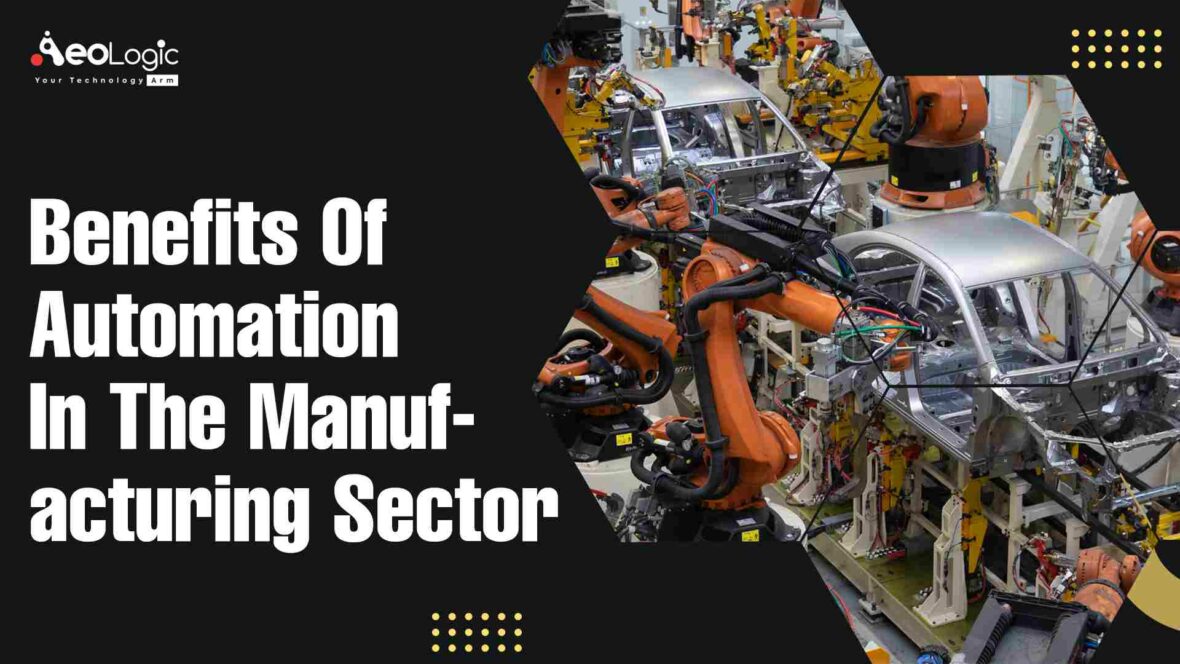For years, factories are at the foreground for innovation around automation, robotics, and process improvement. Since the age of “Industry 4.0” has started, an entirely another generation of manufacturing automation solutions has been introduced varying from 5G to artificial intelligence and the Internet of Things. One of the arenas, that has observed significant transformation as compared to others is Manufacturing Process Automation. There are vast benefits of Manufacturing Process Automation. According to the latest study by McKinsey, the manufacturing sector has the highest potential for more automation and yet has been one of the most automated sectors.
Manufacturing Process Automation
Manufacturing Process Automation can be defined as the implementation of technology to reduce manual work and automate the production process. It is used to automate industrial control applications that operate facilities in plants and factories. Such as mining or mil operations, cement factories, paper, and pulp factories, oil refineries, chemical plants, and electric plants. Manufacturing process automation applications are constantly monitored. It controls digital and analog measurements, by implementing software especially proposed for control of the systems in a plant or factory. It also automates monitoring tasks that were once done manually.
Also read: Why Automation is the Key to Fixing Prior Authorization
How does it work?
In manufacturing process automation, a network interconnects several hardware, operator terminals, valves, actuators, sensors, and controllers to adjust process variables like switches, speeds, vibration, pressure, flow, and temperature. The network system makes use of open and closed control loop feedback systems, like Cascade control loops, to control process variables and Proportional Integral Derivative (PID) controllers.
In the manufacturing process, automation applications sensors disseminated throughout the plant or factories gather data on flows, pressures, temperatures, etc automatically monitor performance values, and the quality of outputs. It determines the best suitable settings to operate the production equipment. The data gathered is stored and calculated for repeated analysis to confirm operational productivity and safe functioning environments. Any change in operation settings is automatically regulated to attain optimum production.
There are numerous benefits of manufacturing process automation which are the following:
· Reduction of costs and production waste
To appropriately use techniques of lean inventory in an organization, one needs to accept equipment that can facilitate tracking WIP manufacturing costs, operational progress, and inventory movements. Manufacturing process automation will enable the organization to control several projects at a time. Hence it will help in more revenue generation.
· Enhance product quality
By keeping a record of real-time data of the products, a business can enhance the quality of production. This enables the business to identify the underlying issues with the products. Hence helping in making relevant changes.
· Enhance response time
With the help of real-time data, one can obtain a better understanding of inventory levels, know immediately when to start production, to order more material. Thus, gradually improving the fulfilment rate.
· Accomplishment of Impossible Manual Tasks
There are several manufacturing processes and operations that cannot be performed without involving machines. For example, making complex surfaces with Programmable Logic Controllers (PLC), rapid prototyping through graphic modeling, or integrated fabrication of circuits and numerical controlled systems. These tasks require accuracy, geometry, and miniaturization. These are all impossible to obtain manually.
Also read: IoT Technologies Can Help Better Maintain Campus Buildings
· Improved workplace safety
Shifting some of the dangerous tasks to machines can build a workplace safer for humans. The health and safety of employees have become a priority since the Occupational Safety and Health Act has come into place in 1970.
· Improved labor productivity
One such benefit of manufacturing process automation is that it performs tasks more effectively and efficiently when compared to manual tasks. Manufacturing process automation will improve the total rate of production and labor productivity.
· Decreased manual tasks
Manufacturing process automation can decrease various operations that are boring, tiring, or repetitive for employees.
· Decrease errors
Since humans tend to make calculation errors, a machine will decrease the errors and miscalculations. Hence, it makes the process more reliable.
Conclusion
Above were the few stated benefits of manufacturing process automation. Implementing manufacturing process automation increases product quality and efficiency all while reducing the overall costs. It also eliminated the probability of errors. Businesses that are incorporating manufacturing process automation are going to develop the standard soon. Moreover, as the technology becomes more accessible and improves in quality, it is only going to be more crucial that the businesses use manufacturing process automation. Even for automation of one process.
If you are planning to automate your manufacturing process, we recommend you to contact our industry experts, who can guide you and suggest ways that are best suitable for your business.
Feel free to connect with us at Aeologic Technologies.
FAQs
What are the benefits of manufacturing process automation?
Manufacturing process automation has various benefits varying from improved quality products to elimination of errors, reduction in overall costs, ensuring workplace safety, more reliable products, etc
What is manufacturing process automation?
Manufacturing process automation is the process of using technology to automate the production system and eliminate manual tasks. This involves everything ranging from controlling the production line to the use of robots in assembling products to implementing software.






